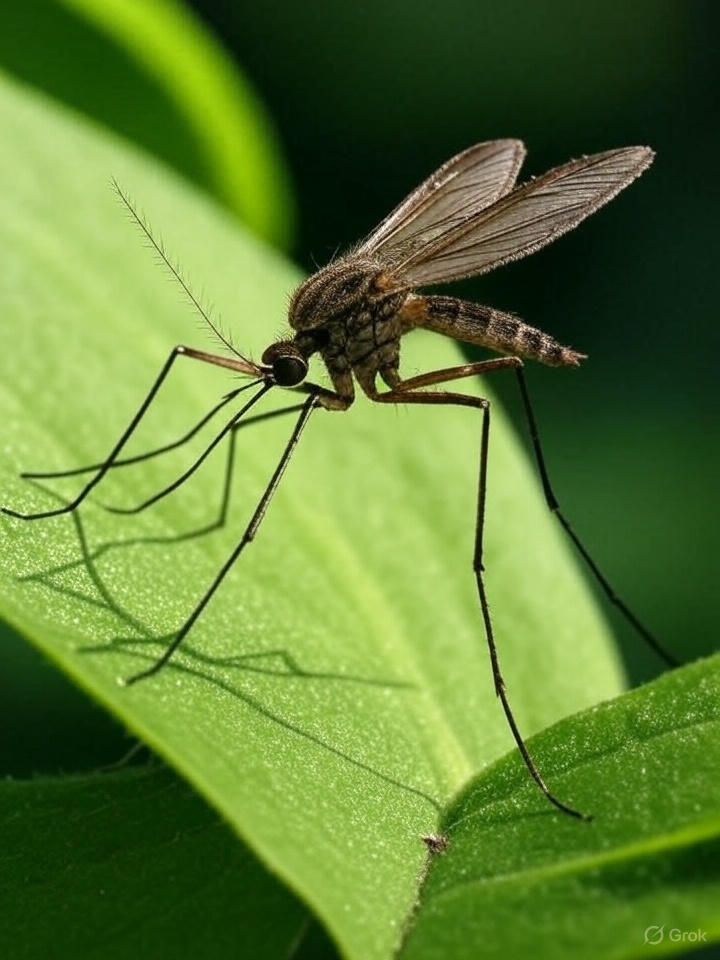
Daniel Otera
Every August 20th, the world pauses to reflect on a tiny yet formidable adversary: the mosquito. World Mosquito Day, established to mark Sir Ronald Ross’s 1897 discovery that female Anopheles mosquitoes transmit malaria, is not just a commemoration; it is a call to action.
In Nigeria, where mosquitoes claim countless lives and burden millions with disease, this day underscores the urgency of innovative, data-driven solutions to combat mosquito-borne illnesses.
Mosquitoes belong to the Culicidae family, with over 3,500 species worldwide. However, only a few are responsible for the majority of human deaths. In Nigeria, Anopheles gambiae, Aedes aegypti, and Culex species dominate, transmitting deadly diseases such as malaria, dengue, yellow fever, and lymphatic filariasis. According to the World Health Organization (WHO), vector-borne diseases account for over 17% of global infectious diseases, causing more than 700,000 deaths annually, with malaria alone responsible for 608,000 deaths in 2023. Nigeria bears a disproportionate burden, accounting for 31.9% of global malaria deaths, with 194,000 fatalities in 2020 alone.
Mosquitoes, particularly female mosquitoes, are among the deadliest creatures on Earth, thanks to their ability to transmit pathogens through blood meals. Females require blood proteins to develop eggs, and while feeding, they inject saliva that can carry viruses responsible for diseases like malaria, dengue, and Zika.
Dr. Patrick Kelly, Director of Global Epidemiology for Tick-Borne Diseases at Pfizer, describes mosquitoes as highly efficient feeders, honed by millions of years of evolutionary refinement. Mosquitoes are particularly attracted to humans due to the carbon dioxide we exhale, the body heat we radiate, and the lactic acid in our sweat.
In Nigeria, mosquitoes thrive in the country’s tropical conditions. Humidity and stagnant water create ideal breeding grounds. Species like Anopheles gambiae breed in rural puddles, while Aedes aegypti, the vector for dengue, yellow fever, and Zika, is prevalent in urban areas, especially in unattended water containers.
The country accounts for 27% of global malaria cases, with 68 million cases reported in 2023. Children under five and pregnant women are most vulnerable, comprising 70% of malaria-related deaths. Dengue is also on the rise, with Nigeria reporting 1,900 deaths in 2025, alongside 3.6 million global cases.
The economic toll is staggering, with malaria costing Nigeria $1.1 billion annually in lost productivity and healthcare expenses. Dengue’s global economic impact, driven by Aedes aegypti, reached $3.1 billion in 2024, with Nigeria’s urban centers like Lagos and Abuja increasingly at risk due to rapid urbanization.
The 2025 theme for World Mosquito Day, “Accelerating the Fight Against Malaria for a More Equitable World,” highlights the need for inclusive health solutions in Nigeria. Despite progress in reducing malaria prevalence, access to prevention tools remains limited. Only 52% of Nigerian households own insecticide-treated nets (ITNs), and only 36% of children under five sleep under them.
Innovation is key in reshaping the fight against mosquitoes. The World Mosquito Program’s Wolbachia method, which reduces mosquitoes’ ability to transmit viruses, has shown promise. In Indonesia, dengue cases dropped by 77%, with hospitalizations down by 86%. Nigeria is exploring similar interventions with pilot projects in urban areas like Lagos.
Genetic modification of mosquitoes is another frontier. Nigeria has begun collaborating with Target Malaria, an initiative aimed at reducing Anopheles populations. The goal is to tailor control measures based on distinctions between mosquito species, helping to enhance control efforts.
Nigeria’s fight against mosquitoes is multifaceted. Poverty, which affects 40% of the population, limits access to preventive tools like ITNs. Overburdened healthcare systems struggle during outbreaks, particularly in rural areas. The 2020 emergence of Anopheles stephensi in Lagos highlighted gaps in urban vector surveillance. Climate change also exacerbates the situation, as higher temperatures and increased rainfall create suitable habitats for mosquitoes.
Drug resistance is another growing concern, with malaria parasites increasingly resistant to artemisinin and chloroquine, complicating treatment. Dengue, with no widely available vaccine, relies on vector control. However, insecticide resistance in Aedes aegypti is reducing the effectiveness of traditional control methods.
World Mosquito Day 2025 emphasizes the importance of community-driven solutions. The WHO advocates for behavioral changes such as eliminating standing water and using ITNs. In Nigeria, community health workers distribute nets and educate households, though inconsistent follow-through hampers progress.
Dr. Céline Gossner of the European Centre for Disease Prevention and Control (ECDC) advises, “Prevention is critical. Simple measures like window screens and repellents can save lives.” Protecting vulnerable groups, particularly children, is paramount in Nigeria, where 60% of malaria deaths occur in children.
Practical Tips for Mosquito Control
Eliminate Breeding Sites: Clear stagnant water from containers, gutters, and tires.
Use ITNs: Sleep under insecticide-treated nets, especially in rural areas.
Apply Repellents: Use DEET-based products during dusk and dawn.
Support Community Efforts: Join local clean-up drives to reduce mosquito habitats.
While mosquitoes are often seen as pests, they play vital roles within ecosystems. Their larvae contribute to water filtration, feeding on microorganisms and detritus, which helps keep water bodies clean. Mosquitoes are also a key food source for species like fish, bats, and dragonflies, supporting diverse ecosystems.
Some mosquito species, such as Toxorhynchites, act as natural pest controllers by preying on other mosquito larvae, reducing the spread of diseases. Thus, controlling mosquito populations without disrupting ecosystems is critical. Methods like Wolbachia-based control, which sterilizes mosquitoes or prevents disease transmission, offer a promising solution.
Nigeria’s fight against mosquitoes demands innovation and equity. With the global success of ITNs in preventing malaria, scaling up access in Nigeria could save millions. Emerging tools like spatial repellents and AI-driven outbreak prediction offer hope.
“We need to break down silos between malaria and dengue funding,” says Dr. Michael B. Macdonald, a public health entomologist.
By combining community-driven efforts, innovative solutions, and equitable access to prevention tools, Nigeria can reduce the devastating impact of mosquitoes and take significant strides towards a malaria-free future.
